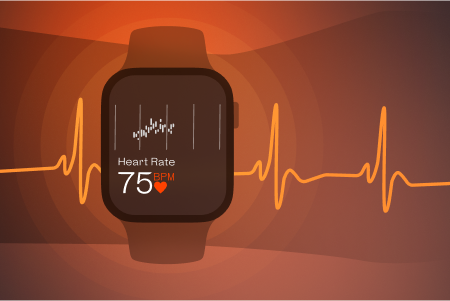


Welltory is the Ultimate HRV App





In today’s fast-paced world, stress has become an inherent part of many individuals’ lives, especially in their professional lives. In fact, 83% of US workers suffer from work-related stress. This figure is shocking and shows a significant increase from the 75% of workers who reported feeling stressed at work in 2021.
According to ComPsych, which survived employees across industries in North America, 42% of workers lose 15 to 30 minutes of productive and efficient work per day due to stress, 34% lose up to an hour, and only 24% of employees don’t feel that their productivity is affected by stress. Moreover, when it comes to first responders and life-savers, research shows that burnout significantly impacts their safety performance.
Let’s look at the relationship between stress and productivity and how Welltory can help you plan better, tweak your workflow for a more efficient day, and avoid burnout by analyzing your health data.
We can divide stress into three categories:
Good stress, also known as eustress, is a positive experience that can motivate people to take risks and achieve their goals. It can be beneficial for self-esteem, impulse control, and decision-making.
Tolerable stress is a type of stress that can be managed with the right support and coping mechanisms. Difficult or challenging situations often cause it, but it does not have a lasting negative impact on a person’s health or well-being.
Toxic stress is a type of stress that is severe and prolonged. It can have a lasting negative impact on a person’s health and well-being, and it can impair their ability to cope with stress in the future.
When you are under pressure (physical or emotional), your body releases a mix of stress hormones (adrenaline, noradrenaline, and cortisol) and chemicals that can increase your blood pressure and heart rate. It can also lead to muscle tension, making you feel even more tired and irritated.
Stress in the workplace is a complex phenomenon that can have both positive and negative effects on productivity. When stress is excessive, it can overwhelm you, leading to a fall in your ability to focus, impaired decision-making, and reduced efficiency. It can also contribute to physical and mental health issues, further hindering productivity.
Research highlights the detrimental impact of chronic work-related stress on productivity, with higher levels of stress being associated with lower job performance and decreased job satisfaction.
On the other hand, when stress levels are too low, individuals may experience a lack of motivation and drive, resulting in complacency and reduced productivity. Studies demonstrate that positive stress that is beneficial occurs when information is crucial or meaningful, compelling the organism to take action and consequently adapt, leading to a state that is functionally superior to the previous one. Optimal stress activates the brain’s arousal systems and can actually enhance cognitive performance, increasing alertness and focus, leading to improved productivity.
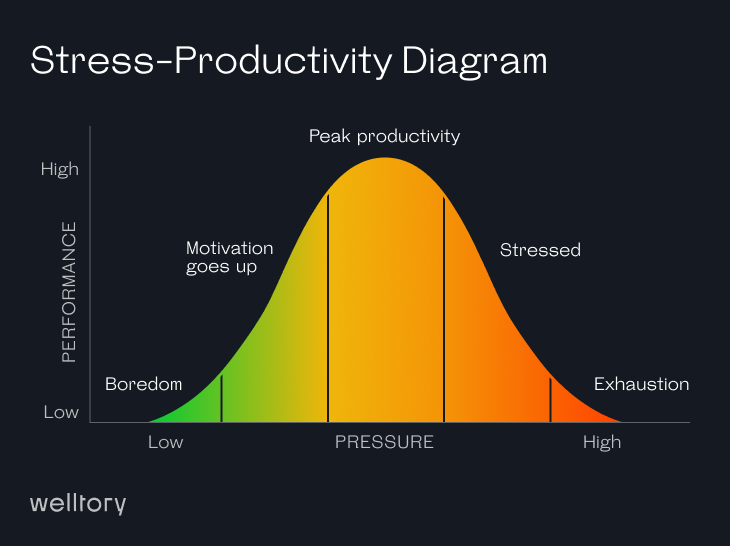
Stress can have both positive and negative effects on productivity. In the short term, stress can lead to increased focus and motivation, which can lead to increased productivity. However, in the long term, stress can lead to decreased productivity due to fatigue, burnout, and health problems. Let’s look at how you can benefit from stress in the short run.
One perspective suggests a positive correlation between work stress and employee performance, indicating that stress serves as a motivating factor that drives employees to work diligently and enhance their work efficiency.
Utilizing stress as a fuel for productivity involves harnessing its positive aspects and managing it effectively. Research suggests several strategies to achieve this:
Reappraisal: Viewing stress as an opportunity rather than a threat can enhance performance. Studies have shown that individuals who perceive stress as beneficial exhibit improved cognitive performance and job satisfaction.
Mindfulness and resilience training: Developing mindfulness skills and resilience can help individuals cope with stress and improve productivity. Research has demonstrated the effectiveness of mindfulness-based interventions in reducing stress levels and enhancing cognitive functioning.
Supportive social networks: Having strong social support systems can buffer the negative effects of stress and foster productivity. Studies indicate that social support at work positively influences stress management and job performance.
Effective time management: Prioritizing tasks, setting goals, and maintaining a balanced schedule can alleviate stress and increase productivity.
Understanding your stress: Understanding how stress affects your body can help you manage it better and increase your productivity. Welltory calculates your level of physical stress and energy based on the evaluation of heart rate variability. By analyzing beat-to-beat changes in your heart rate, it is possible to monitor your all-day stress and help you find this balance and use some of your stress to fuel productivity.
Achieving a balance in managing stress is crucial for maintaining health and productivity. Excessive stress can lead to burnout, while chronic procrastination can hinder progress and increase stress levels. Both these phenomena are intricately connected to the sympathetic nervous system, which regulates the body’s response to stress. Building resilience, adopting effective time management techniques, and practicing stress reduction strategies like mindfulness can help achieve a balance.
We already covered some techniques, now let’s see how technology can help. Our latest feature takes on the hurdles that keep people from thriving at work. It offers valuable insights to enhance productivity and work-life balance. Users can track and analyze their time allocation, allowing them to understand where their time goes and make necessary adjustments. By identifying patterns and habits within their workday over longer periods, individuals can determine their most and least productive times and moments when it is challenging to focus.
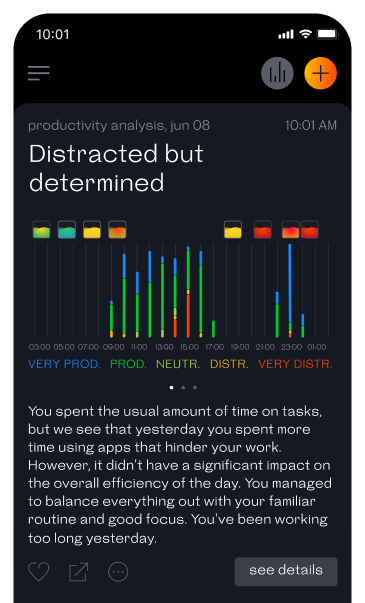
Monitoring productivity changes over time enables users to track progress or identify potential burnout risks. The feature also helps users maintain a work-life balance by monitoring total work hours and avoiding overexertion, particularly while working from home. Understanding the external and internal factors that impact productivity aids in effective planning and addressing modifiable elements. Additionally, the feature encourages users to minimize distractions, enhance focus, overcome procrastination, and receive feedback on their work, alleviating concerns about performance and productivity.
We combine your RescueTime data and your Welltory data to get a clear picture of your workday based on how much time you spend in apps and on sites you’ve labeled productive or distracting, as well as how often you switch between sites, and whether you’re taking enough breaks.
What you’ll see:
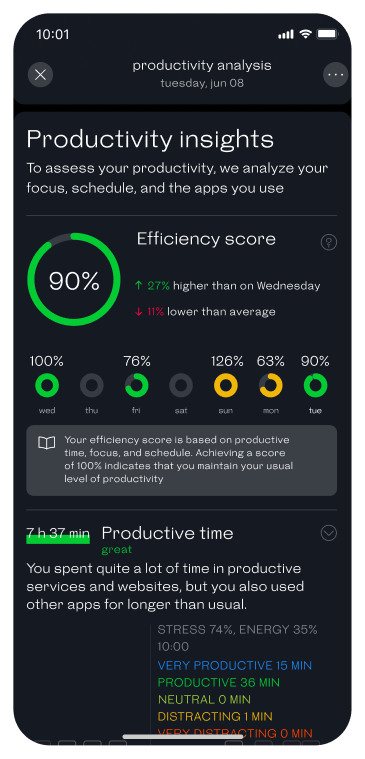
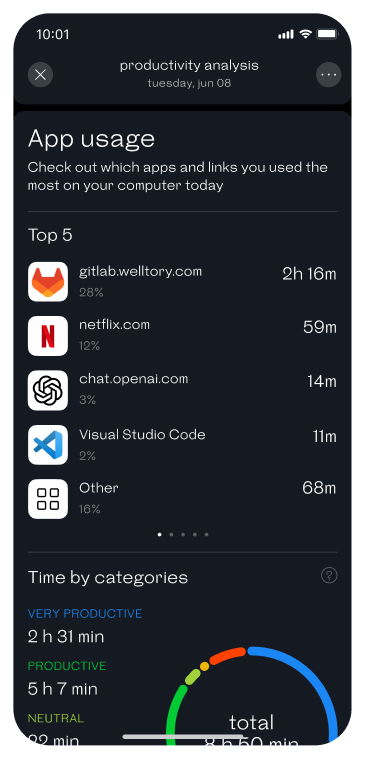
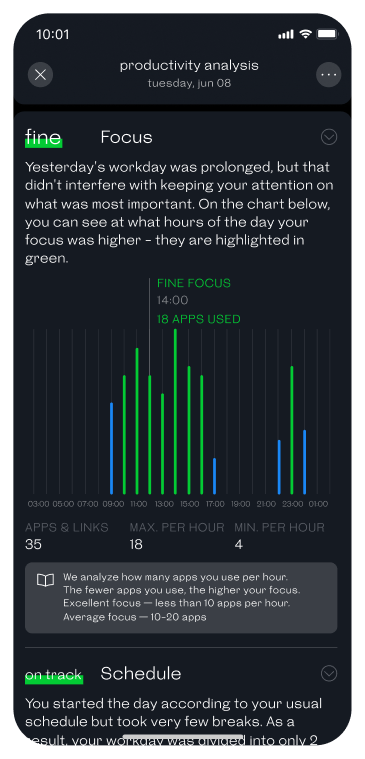
Over time, we’ll also show you correlations between your workflow, how you’re feeling, and your environment. Maybe you’re more distracted in the afternoon, or a consistent start time helps you get through your work faster.
Understanding yourself and your working patterns better can help you gain valuable insights into your time management, productivity patterns, and work-life balance, empowering you to make informed decisions and optimize your success.
Welltory Team, 7 July. 2023
 App Store
App Store
 Google Play
Google Play
 Huawei AppGallery
Huawei AppGallery
 Galaxy Store
Galaxy Store

